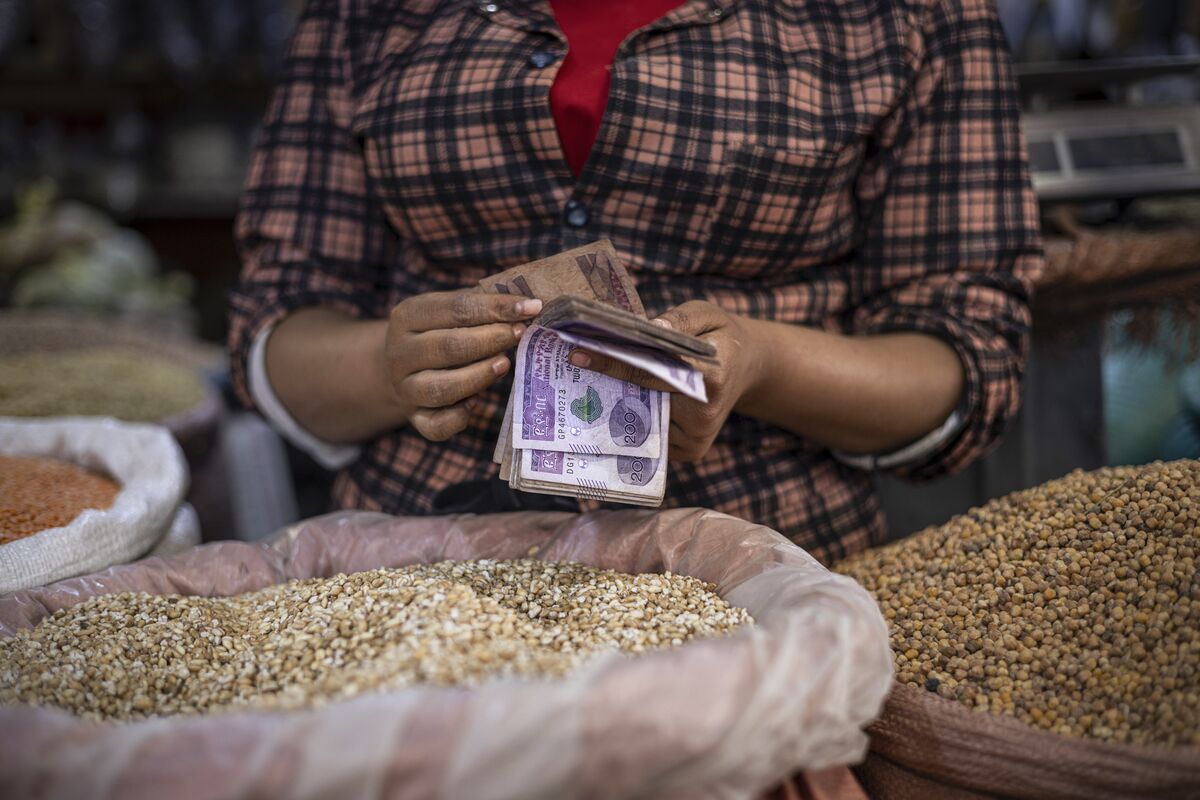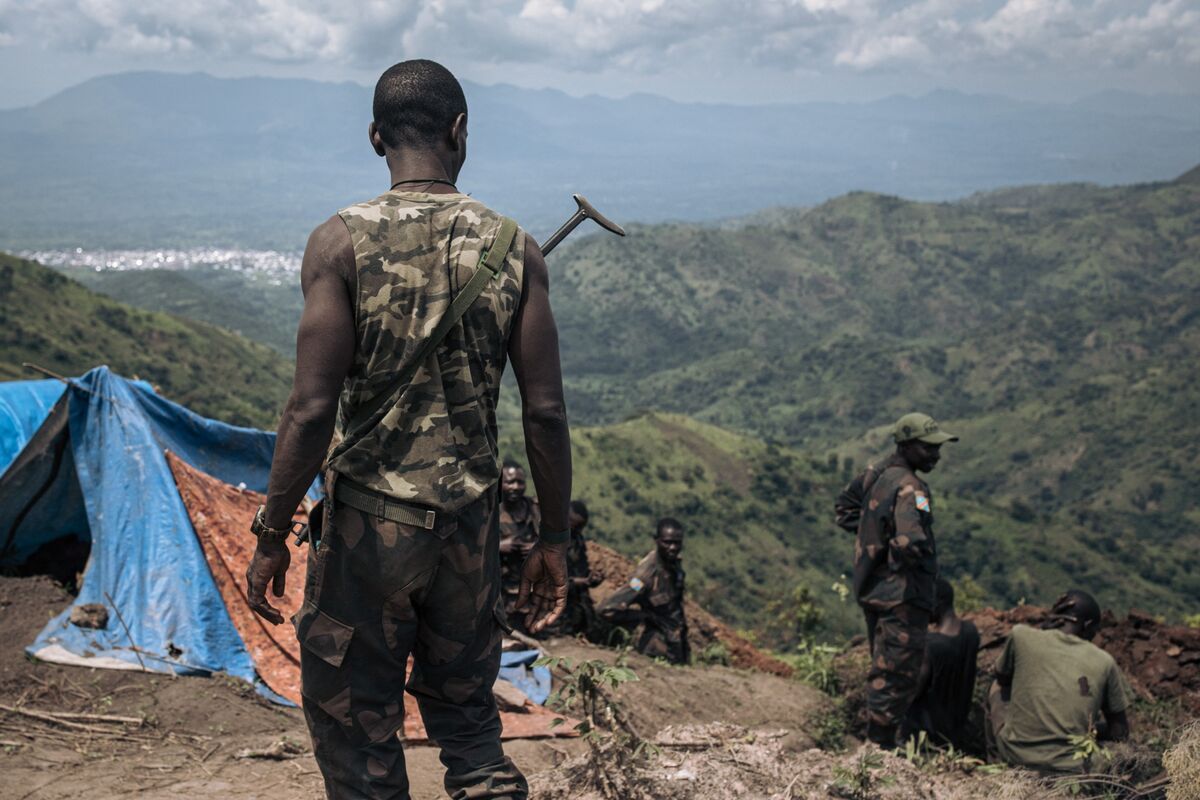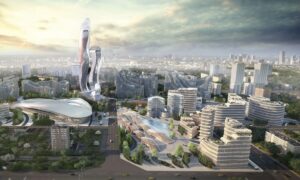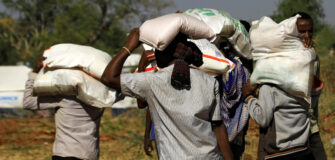Share
Welcome to Next Africa, a twice-weekly newsletter on where the continent stands now — and where it’s headed. Sign up here to have it delivered to your email.
President Bola Tinubu’s resolve to turn around Nigeria’s economy and fix its shaky government finances is facing its sternest test yet.
Thousands of people have joined marches in cities chanting “we are hungry,” a stark illustration of how high living costs has impacted on citizens’ lives. The security forces responded with a heavy hand — Amnesty International says 13 people who were peacefully participating in rallies were killed in three separate incidents.
While the unrest appears to have been quelled for now, there’s a high risk of a resurgence — if Kenya’s recent experience is anything to go by.
 The upheaval may also be a harbinger for Ethiopia, where currency reforms to lock in bailouts will invariably come with a price shock.
The upheaval may also be a harbinger for Ethiopia, where currency reforms to lock in bailouts will invariably come with a price shock.
Organizers of the Nigerian campaign have used similar social-media platforms to those employed to drum up support in Kenya, and called for 10 days of rallies.
The discontent stems from Tinubu’s decision to ease currency controls and reduce subsidies on fuel and electricity, reforms that were sorely needed to rein in runaway government debt and attract the foreign investment needed to kick start the economy.
But they have also hurt ordinary Nigerians, more the 80 million of whom live in extreme poverty, with inflation jumping to its highest level in almost three decades (sending interest rates up too) and many finding it increasingly difficult to make ends meet.
The president has already partially walked back on his commitment to scrap a $10 billion subsidy on gasoline, with the authorities capping pump prices at below cost.
He’s stood firm so far on his decision to ease foreign-exchange restrictions, a move that sought to secure an influx of foreign capital and make Nigeria a more attractive investment destination. It’s led to an almost 50% slump in the naira-dollar exchange rate, though.
Investors who fear the government will bow to some of the protesters’ demands sold off the Nigeria’s dollar bonds on Thursday and drove down share prices.
A seasoned political operator, Tinubu will need all his smarts to see off the public discontent, failing which economic reforms will be back to square one.
Key stories and opinion:
‘We Are Hungry,’ Chant Nigerian Protesters as 13 People Die
Protesters Defy Nigeria’s Bid to Avoid Kenya-Style Dissent
Nigeria Tycoon Urges Banks to Cut Private Jets, Pay Windfall Tax
Why Nigeria’s Currency Slumped, and What Happens Next
Where Will the Fire in Kenya Leap to Next?: Justice Malala
Also, click here to watch the latest edition of Africa Amplified, Bloomberg TV’s monthly show focused exclusively on the continent.
News Roundup
Ethiopia’s decision this week to float its currency unlocked more than $20 billion in financing from the World Bank and International Monetary Fund — money the government desperately needs to tackle the East African nation’s debt burden and open up the economy. The Horn of Africa nation is the latest in a long line of countries that borrowed heavily during the low-rates era and have now been forced to enact painful reforms to secure new financing to address debt burdens. Meanwhile, Prime Minister Abiy Ahmed wants the birr to trade in line with the currency’s rate on the street.

A vendor counts out birr banknotes.Photographer
Ivory Coast has activated its emergency health system after confirming two cases of mpox, a cousin of the smallpox virus that causes flu-like symptoms followed by a rash over the entire body. One infection was discovered in the capital Abidjan and the other in the southwestern town of Iboké, near the border with Liberia. South Africa found 16 cases that led to three deaths in a recent outbreak. Mpox has for years been mostly confined to developing countries, though it spread across Europe and the US in 2022. In another development, sub-Saharan Africa is no longer the region with the most new HIV infections.
M23 rebels in the Democratic Republic of Congo said they aren’t bound by an agreement to reduce hostilities signed this week between the government and neighboring Rwanda, although they are prepared to respect it. The two countries agreed to ease tensions in eastern Congo at a July 30 meeting overseen by Angola. Congo accuses Rwanda of backing the M23 rebellion in the region, which has displaced more than 1 million people. Rwanda denies the claim. Columnist Justice Malala warns there’s a risk of a repeat of a regional conflict that ended two decades ago and was the deadliest since World War II.

Soldiers near Kibirizi in eastern Congo on May 14
Mozambique won a fraud case over a $2 billion bond scandal that embroiled Credit Suisse and created a financial crisis for the southern African nation. After a three-month trial, a London judge ruled that Mozambique was defrauded in a controversial maritime project meant to finance a new coastal patrol and tuna fishing fleet. Separately, a United Nations report warned that Islamic State-backed insurgents who’ve delayed a $20 billion gas project in the country are becoming increasingly active.
Italy has been at the forefront of European nations that have seen a surge in immigration from the Middle East and Africa. As more people arrive fleeing war, government oppression and poverty, the Italian far right has stoked a climate of fear. In this documentary, Italy’s Hunt for a Mysterious Nigerian Mafia, Bloomberg Investigates reveals how a fake crime manifesto called the “Green Bible” is being used to imprison immigrants from the West African nation.
Alex Beard, the billionaire former head of oil at Glencore, was charged with corruption by the UK’s top fraud agency, alongside four other ex-employees from the commodities trader for illicit deals in West Africa. Beard, one of the company’s top executives for more than a decade until 2019, is the highest profile individual to be charged in a sweeping series of investigations into corruption and market manipulation. Britain’s Serious Fraud Office accused him of conspiring to make corrupt payments to benefit government officials and employees of state-owned oil firms in Nigeria and Cameroon.
Data Watch
Kenyan annual inflation eased to a four-year low of 4.3% in July, helped by a strong shilling that’s cooled transport costs.
The falling price of pap — a beloved South African cornmeal dish that forms part of a township shisanyama barbecue — helped spur a decline in the average cost of a backyard barbeque in July.
Mozambique’s central bank became the first in Africa this year to reduce its benchmark lending rate for a fourth time.
The number of rhinos killed illegally in South Africa plunged in May and June after park staff removed the horns from more than 1,000 of the animals in a reserve targeted by poachers.
Coming Up
Aug. 5 Country PMI reports for Mozambique, Uganda, South Africa and Kenya
Aug. 6 Kenya and Madagascar interest-rate decisions, PMIs for Zambia and Ghana
Aug. 7 South Africa reserves data for July, Mauritius inflation & reserves, also for July, Kenya briefing on interest-rate decision
Aug. 8 South Africa manufacturing for June, Kenya money supply for June
Aug. 9 Bloomberg monthly economic survey for South Africa, Rwanda inflation
Quote of the Week
“You can’t milk a cow that is starving — but that’s often what the IMF policies are trying to do, while offering just a bit of water in return. It’s unsustainable.”
Hannah Ryder, chief executive officer of Development Reimagined.
Ryder was commenting on the conditions related to IMF loans, when asked about funding for Ethiopia.

A digital rendering of Akon City
A single arched concrete block juts out of a field in Senegal where R&B singer Akon first laid the foundation stone for his planned $6 billion metropolis. The West African nation granted the artist 136 acres of land on its Atlantic Coast in 2020 to build Akon City — envisioned as a real-life Wakanda, the fictional country from Marvel Studios’ Black Panther films. Complete with condominiums, amusement parks and a seaside resort in gravity-defying skyscrapers rising above the rural landscape, Akon City would run on solar power and his Akoin cryptocurrency, the American-Senegalese singer said during a flashy presentation in the capital. Today, goats and cows graze the deserted pasture 60 miles south of Dakar, and authorities are growing increasingly impatient.
Source: https://www.bloomberg.com/


